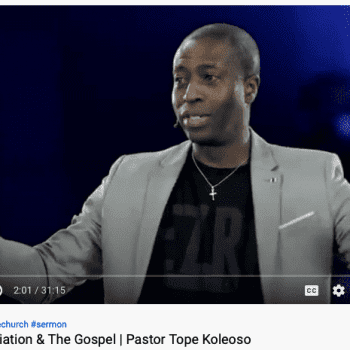In todays blog interview Richard makes it very clear that as far as the UK’s Christian Unions are concerned charismatics (especially from newfrontiers) are welcome but those who question the atonement ought to go elsewhere……
Adrian: It is my pleasure to welcome to my blog today the Director of UCCF in the UK, Richard Cunningham. For my American readers, UCCF is equivalent to your Intervarsity Fellowship Richard, it is a pleasure to welcome you, please can you begin by telling us a bit about yourself and how you ended up leading the UCCF?
Richard: I live in north Oxfordshire with my wife and five kids. I’m an ordained Anglican minister and previously worked for St Andrew’s Oxford. I first came across the UCCF as a student in London. I was greatly helped by a UCCF staff worker during a time of profound intellectual doubt about the Christian faith. He introduced me to the writings of Francis Schaeffer and CS Lewis. This not only rescued my faith, but also gave me the confidence to run Agnostics Anonymous courses for my university mates- a number of who were converted.
Following a stint on staff as Evangelism trainer in the 90s I remained hugely interested in the ministry of UCCF and continued leading student missions. But I never imagined I would ever go back to work for UCCF- so was as surprised as anyone when I was made Director in 2004.
Adrian: Richard, how would you describe the state of the Christian Union movement in the UK and worldwide at the moment?
Richard: The UK CUs in the established Universities are for the most part vigorously healthy. Many CUs are still the largest student societies on campus. Some of the newer Universities with multi- site campuses and minimal student accommodation make it harder for the CUs to reach their fellow students.
I have just come from taking meetings in the north of England which were most encouraging: I spoke to a packed lunchtime student gathering in Manchester on the subject of how can you say Jesus is the only way? I also spoke at the Durham University CU Carol service with 2,000 students and lecturers crammed into Durham Cathedral with many signing up for enquirer’s courses. Similarly Exeter Uni hired the main stand of the football ground for their carol service and had about 3000 attending. For the first time in memory the University of Falmouth held a carol service and 200 attended. In other words CUs are wonderfully placed to reach their campuses for Christ.
It is much harder to answer that question for the whole of IFES (International Fellowship of Evangelical Students) of which UCCF is a founding member. The challenges and opportunities across countries and continents vary so massively. Some CUs in Moslem countries are barely viable, whereas The CU in University of Rwanda is 3000 strong and has grown in- spite of most of the CU leaders and IFES staff being murdered in the genocide of 95. The former leader of the Rwandan work was converted as an international student at Bangor Uni through the witness of the CU. He is now vice chair of the truth and reconciliation committee in Rwanda.
Adrian: What do you see as the role of a Christian Union? What is it there for?
Richard: CUs are mission teams, whose team members (gathered from both sending and local churches) spend 3-4 years helping each other to live and speak for Jesus on campus. They are not churches and are not a substitute for churches. But since their members are living and studying together on campus, CUs can quickly become vibrant witnessing communities reaching out to fellow students.
Students have a freedom to set up societies; book college rooms and reach their friends in a way that churches don’t. University authorities are increasingly nervous about religious societies on campus, especially in the wake of 9/11. There is a serious risk to these freedoms now enjoyed if churches start moving their activities onto campus. It is important for both sending and receiving churches to support the CU leaders (with all the obvious limitations of young leadership) with the opportunities that God has given to them.
Adrian: We often hear that many students involved in CU fall away from Christ after graduation. Is this the case?
Richard: I think that the CUs rescue many students who come up to college with the intention of giving up on Church and faith.
Clearly the mobility of a new graduate (job, marriage, location) creates a big opportunity for reinvention. Christians are even more vulnerable in a work context, because they do not have the support of peers in a Christian Union. It is the students who are the most sorted theologically and who nail their colours to the mast (morally and evangelistically) that tend to be the most stable later on.
By contrast those who leave college without clear convictions and theological clarity seem less able to hold on to their faith after graduation. For example I heard last week of a graduate from Manchester who avoided the CU because it seemed too tight theologically. But upon graduating she worked among HIV AIDS patients in South Africa and rapidly came to the conclusion that she could no longer believe in God in the face of all the suffering she was seeing.
Adrian: How should Christian Unions relate to churches?
Richard: UCCF The Christian Unions is a partnership between students, staff and supporters all of whom are encouraged to be committed to a local church. A CU does not have the breadth and depth of age, maturity and gifting to be a substitute for church. A CU does not have the tested maturity of church leadership. CU members are encouraged to seek pastoral oversight and care from their local church and to see CU as a short-term mission community.
Because UCCF has such a high view of local church it is not surprising that a huge proportion of our former staff end up leading churches. The health of many CUs is greatly affected by the presence of lively, Bible teaching churches in the vicinity. Also without church support UCCF would be barely viable.
Adrian: Relationships between CUs and churches are not always so easy- what do you feel are the most common pitfalls and how can we avoid them?
Richard: There are 2 main pitfalls. One is when a CU misunderstands itself and begins to ape a church by putting on more and more meetings which cover everything from how lead worship to how to have a quiet time. This could lead to some students not having enough time to get involved in a local church.
The other is when a local church misunderstands the nature of a CU and criticizes the existence of student led bible study groups or the teaching of the Bible at main meetings. In the most extreme cases they seek to take over the leadership from the students and regard the CU as a place to extend their own church activities.
Now that may appear a little contradictory at first sight. What is important though is for both students and churches to understand the purpose of a CU. The CU is a mission team in the form of a student society. The officers of the CU are obviously students, because it is inappropriate for anyone other than students to be leading a student society.
The CUs are in existence for their non- members, but obviously they cannot be doing wall-to-wall evangelism. They need weekly team times like any other mission society in which they study what the gospel is in order to live it and tell it more clearly. They also need to pray and mutually encourage each other.
It is important that churches allow CUs to be CUs and not seek to dampen their freedom and joy as they do something quite unique and strategic.
Adrian: Christian Unions seem to vary a lot in
my experience in their friendliness to differing types of Christian. Should a Christian Union be totally accepting of anyone who claims to be a Christian?
I hope that every CU is friendly to anyone and everyone who comes along. UCCF Christian Unions are evangelical. We seek to unite students from different Christian traditions on the essentials of evangelical belief.
This means that non-evangelicals may feel uncomfortable as we will talk about the uniqueness of Christ or the infallibility of scripture or Christ’s death as a propitiation to a holy God etc. We insist that everyone who serves as a leader in the CU is able to sign our doctrinal basis agreeing to maintain the evangelical standing of the CU.
All evangelicals should feel at home in CU as these evangelical essentials that unify us across the denominations are shared by us all and speak of the wonder of God’s salvation in Christ revealed in Scripture.
Adrian: In the past there has been some CU’s who have not been very accepting of people from charismatic backgrounds. Why do you think that was, and what is being done today to ensure that no longer is the case?
Richard: It is difficult to speak about the past. What I want to be clear about is the present. UCCF wishes to unite all evangelical believers in order to reach the 2 million students in Higher Education, the vast majority of whom know nothing of Jesus. Uniting students in this great task is a joy but can be difficult. The church scene in the UK reflects this. I think that CUs can one of the best examples of evangelical partnership in the UK. In our CUs and on our staff we have Christians from across the evangelicalspectrum.
In the past some Charismatics were insistent on a particular view of the gifts of the Spirit and that all gifts should be practiced in the CU as they are practiced in the local church. Some CUs reflected the evangelical church at the time of the charismatic renewal and became nervous and suspicious.
But that was then- the question for now is how do we ensure Charismatics are accepted in to CUs? The CU needs to be clear about its mission. Uniting students for mission and not being the local church should make CUs accepting of all evangelicals- charismatic or non-Charismatic. Mission drives this unity, based on the great evangelical truths of our faith. People who love the Gospel and the Word of God will be happy in CUs and UCCF whether charismatic or not.
Adrian: I noticed that UCCF as a national body certainly seems to be working with charismatic groups, especially newfrontiers. I understand Terry Virgo recently spoke at your national leaders meeting and is also on your national advisory board. That may be a surprise to some, can you tell me how it came about?
Richard: It is UCCF’s policy to invite keynote speakers and advisors on merit alone. Terry is a world-renowned Bible teacher with a high view of Scripture and believes passionately in proclamation evangelism. The national advisory board should reflect the breath of UCCF so we invite men and women who are recognized in the evangelical world for their maturity and expertise from across the evangelical spectrum.
We have a number of staff and Relay (one year staff) who are very appreciative of the ministry of NFI. It seems to me that, unlike some of the other so- called new churches that seem to be looking for a fresh mandate, NFI are growing rapidly because of their commitment to Scripture and evangelism.
Adrian: How did Terry Virgo go down at the conference?
Richard: His Bible readings were of exceptional quality and unsurprisingly many people (staff and students) felt that what they had heard was life changing. Terry opened up for us the glory and beauty of the Gospel, which drew out a renewed commitment in many.
Adrian: From what you say, charismatics definitely seem to be welcome to work with the UCCF these days, which is a most welcome development. Do you think this is going to be important for the future of the kingdom today?
Richard: This may sound a little grand, but one of the last best hopes for saving British evangelicalism from corrosive tribalism are our university and college CUs. The18 and 19 yr olds flooding into the CUs are tomorrow’s church leaders. They come from a range of church traditions but are easily united (if allowed to) by their desire to stay Christian and reach their friends for Christ.
Their unity is necessarily based around a mere but glorious Christianity. By being a confessional movement, which unites Christians around core Biblical truths we are able to provide a context within which disparate traditions can work together. This has to be good for the future of the British church.
One of my concerns about caricaturing UCCF as anti charismatic (which of course it isn’t) is that CUs can rapidly become politicized. There have been occasions where local charismatic churches have been encouraged to take over existing CU small groups or cells. It is hard to think of any instances where this has not robbed the CU of its unity and evangelistic effectiveness.
Adrian: So does this mean now that for UCCF anything goes? What would your approach be towards those today who are challenging traditional views of the atonement for example? Should CU’s be able to work just as well with them?
Richard: It is not the case that anything goes, neither morally nor doctrinally. We are concerned for godly living and Biblical truth. As I mentioned earlier UCCF is unashamedly confessional, which means that we are as broad as our doctrinal basis allows and only as narrow as it insists. We ask all those who hold office in CUs plus staff and speakers to be able to affirm their belief in the core truths that is the UCCF’s doctrinal basis (DB).
There is a commitment within our DB to Penal substitutionary atonement as a fundamental truth. The origins of UCCF date back to 1919 when a group of students split from the then very large Student Christian Movement because the atonement was not central to SCMs teaching.
For the sake of unity UCCF has flexed (and continues to) culturally and stylistically since these early days. However by Gods grace we will never sell the family silver of core Biblical truth for the sake of unity.
Adrian: Richard, I am sorry but thats all we have time for today. Many, many thanks for joining us. I wish you well in your future ministry…..
















